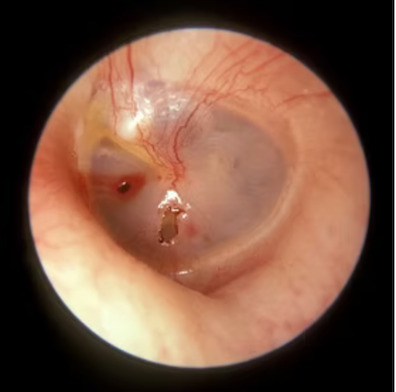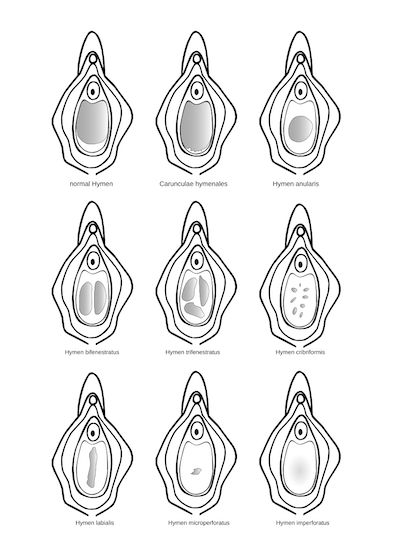
A perforated eardrum. Source: www.durhamhearingspecialists.com.

Various types of hymen. Source: Wikimedia Commons.
We
are their harps
In Sirens Simon Dedalus says to Ben Dollard, "Sure,
you'd burst the tympanum of her ear, man...with an organ like
yours," and Father Cowley chimes in, "Not to mention another
membrane." Every element of this lewd joke—the effect of music
on parts of the human body, the libidinal interchangeability
of those parts (throat and phallus, ear drum and hymen), their
transformation into musical instruments (organ,
tympanum)—draws on threads that run throughout the prose
tapestry of the eleventh chapter. Joyce's schemas
identify the Organ of the episode as the ear, but this is far
too limiting. Ears, eyes, lips, cheeks, hands, fingers,
throat, chest, spine, skin, hair, nose, heart, brain, not to
mention penis and vagina—all make up a corporeal symphony
pulsing with sexual energy. Musical instruments play on people
just as people play on them, and just as variously.
Doctors use tympanum, a Latin word for drum, to name
the membrane stretched across the ear canal whose drumlike
vibration makes human hearing possible. That medical usage
provides a chance connection with an instrument in the
symphony orchestra ("The tympanum," evoked in the
chapter's overture), and the anatomical similarity of the
eardrum to the female hymen brings sexuality into the
metaphorical mix. Music enters human consciousness when air
pounds against the eardrum, just as sexual intercourse begins
with a penis pounding against the hymen. Joyce exploits all of
these connections in the joke between Dedalus, Dollard, and
Cowley: Ben's powerful singing constitutes a quasi-sexual
assault on "her" eardrum. Several paragraphs later in Sirens
Bloom recalls the concert in which Dollard was forced to
perform in a pair of borrowed trousers:
Trousers tight as a drum on him. Musical porkers. Molly did laugh when he went out. Threw herself back across the bed, screaming, kicking. With all his belongings on show. O saints above, I'm drenched! O, the women in the front row! O, I never laughed so many! Well, of course that's what gives him the base barreltone. For instance eunuchs.
Basses get their tympanic voices from their male "belongings"
just as eunuchs get their countertenor voices from the
mutilation of these organs, and Molly's wetness in response to
Ben's hilariously revealing trousers suggests a certain female
receptivity. Circe maps the association between
hearing and sexuality onto the Christian story of the Virgin
being impregnated not by semen in her vagina but by words in
her ear. Combining Gabriel's Annunciation with skeptical
stories of Mary having actually been inseminated by a Roman
soldier, the Jewish Virag squawks, "Panther, the Roman
centurion, polluted her with his genitories. (He sticks
out a flickering phosphorescent scorpion tongue, his hand on
his fork.) Messiah! He burst her tympanum."
In a perceptive short essay titled "Joyce's Lipspeech," Derek
Attridge looks at how body parts are isolated in Sirens,
how they seem to act independently, how they substitute
for one another, how they fuel sexual energy, and how they
make music. He observes that the chapter describes singing
voices in terms that suggest sexuality both male ("Tenderness
it welled: slow, swelling. Full it throbbed...Throb,
a throb, a pulsing proud erect") and female ("Gap in
their voices too. Fill me, I'm warm, dark, open") (63).
The "lips" of his title (labia in Latin) "may be a
synecdochic substitute for the whole individual of which they
are a part, but they may also be a metaphoric substitute for
another organ which they resemble. Miss Douce's lips are twice
given the adjective 'wet', and she complains after her
laughing spree, with undecidable reference, 'I feel all
wet'. (Compare this with Molly's 'I'm drenched'...)"
(62).
Vaginal and seminal wetness also enter the chapter in
variants of the morpheme "flow." Bloom thinks about the language of
flowers suggested by Martha's letter, but this word
flows into thoughts of sexual lubricity: "Means something,
language of flow." The language of romantic and sexual
flow-ers has an intrinsic connection to music: "Tenors get
women by the score. Increase their flow. Throw flower
at his feet when will we meet?" In one of the ecstatic prose
responses to Simon's singing of the aria from Martha,
this coincidence of meanings becomes at once fully sexual and
fully musical: "Flood of warm jimjam lickitup sweetness flowed
to flow in music out, in desire, dark to lick flow,
invading.... To pour o'er slucies pouring gushes. Flood,
gush, flow joygush, tupthrob. Now! Language of love."
Many other parts of the body play parts in this symphony of
sexual receptivity. Skin tingles: "Pores to dilate dilating."
Breasts heave: "Full voice of perfume of what perfume does
your lilactrees. Bosom I saw, both full, throat warbling."
Hands stroke: "Cool hands. Ben Howth, the rhododendrons. We
are their harps." Eyes gaze and conceive: "A liquid
of womb of woman eyeball gazed under a fence of lashes,
calmly, hearing." The entire body responds to powerful
music as to sexual excitement: "Braintipped, cheek touched
with flame, they listened feeling that flow endearing flow
over skin limbs human heart soul spine." Attridge
observes that any part of the body can channel sexual energy:
"the sexual innuendos by means of which the two barmaids urge
one another into orgasmic laughter are all achieved by
displacement: 'And your other eye!'; 'With his bit of beard!';
'Married to the greasy nose!' (Lenehan uses the same technique
in his advances to Miss Kennedy: 'Will you put your bill down
inn my troath and pull upp ah bone?')" (64).
By the same principle of displacement, objects that are not
part of the human body also become metaphorically transmuted
into sexual agents. Simon Dedalus fills his pipe as Miss Douce
pours him a drink: "He fingered shreds of hair, her
maidenhair, her mermaid's, into the bowl." Although
Simon does not flirt with Lydia so explicitly and aggressively
as Lenehan, the prose conveys his desire. As he pokes shreds
of tobacco into his pipe bowl, he (or it) imagines another
kind of fingering, another kind of bowl, other feathery
shreds. When Boylan raps on the front door of Eccles Street,
confidently, insistently, Joyce's spectacularly rhythmic prose
turns the knocker into a phallus: "One rapped on a door,
one tapped with a knock, did he knock Paul de Kock with a
loud proud knocker with a cock carracarracarra cock.
Cockcock." As Miss Douce listens to The Croppy Boy,
her hand lewdly strokes the "smooth jutting" tap handle: "Fro,
to: to, fro: over the polished knob (she knows his eyes, my
eyes, her eyes) her thumb and finger passed in pity: passed,
repassed and, gently touching, then slid so smoothly, slowly
down, a cool firm white enamel baton protruding through
their sliding ring."
To call this virtual masturbation would only reduce the
pulsating sexual reverie to dry clinical observation. Sirens
sometimes does speak of sexuality in clinically abstract
terms, as when Bloom gazes on one of the barmaids: "Blank
face. Virgin should say: or fingered only. Write something on
it: page. If not what becomes of them? Decline, despair. Keeps
them young. Even admire themselves. See." But the language
quickly slips back into lubricity, corporeality, musicality: Play
on her. Lip blow. Body of white woman, a flute alive. Blow
gentle. Loud. Three holes, all women." Freud memorably
characterized sexual desire as "polymorphous perversity"—not
just a spur to heterosexual genital copulation but a
promiscuously open-ended energy directed to oral, anal, and
genital gratifications, other parts of the body, other things.
For Bloom, a woman's body is something to play on, an
instrument of different holes and registers to which he might
gently apply his lips.
Sirens is far and away the most consistently sexual
chapter in Ulysses. Exploration of such feelings is
the central organizing element in its imitation of musical
effects. Joyce may have fooled himself and his readers into
believing that his words reproduce the intricately
mathematical structure of a baroque "fuga per canonem," but
there is nothing pretentious about the way he makes language
evoke the fusion of musical sound and corporeal feeling. Music
consists of two kinds of vibrations: those imparted to the air
by instruments, and those introduced via the tympanic membrane
into the bodies of listeners. Just as a lover can play
sexually on a beloved's body, or a musician on an instrument,
musical performances play on every part of the listener's body
and mind: "We are their harps."